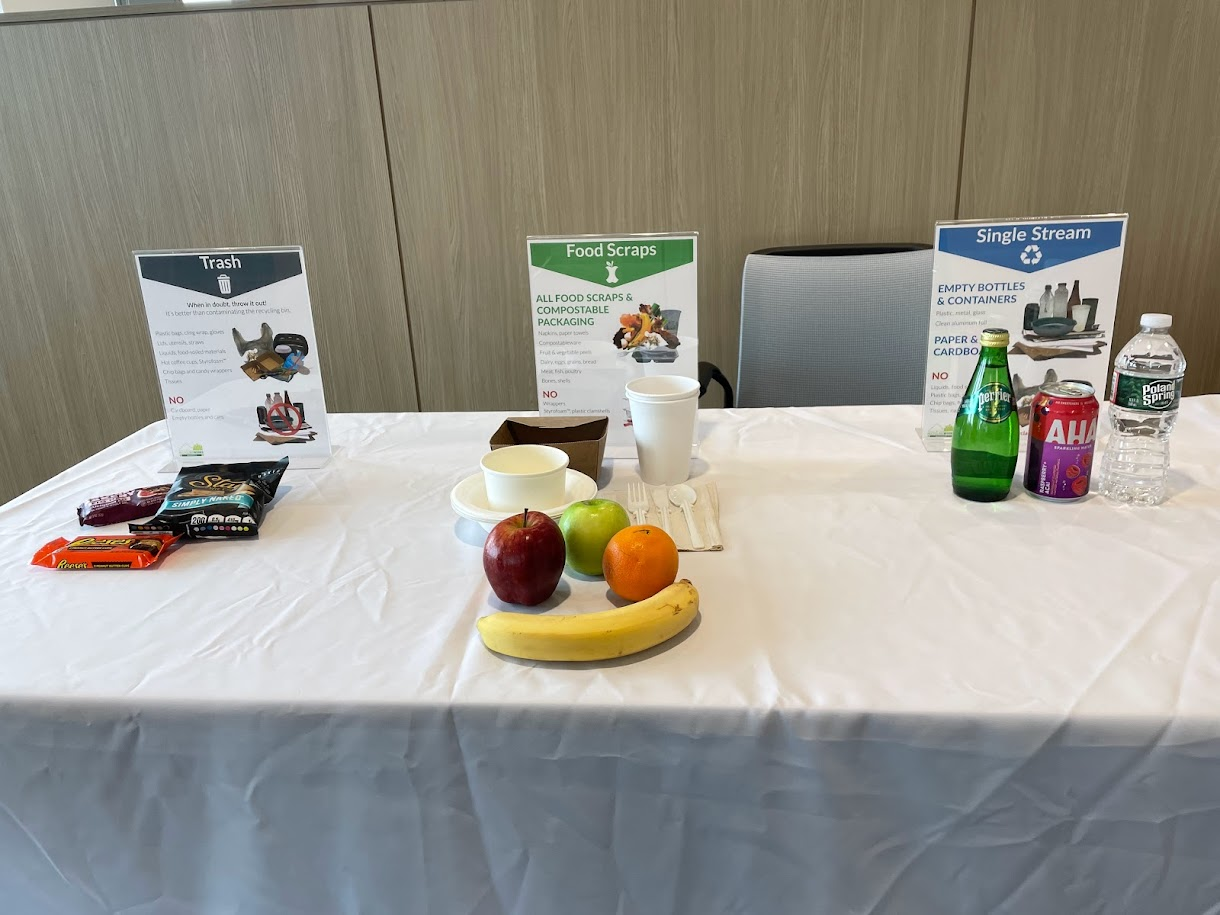Sanofi, a global pharmaceutical company with an administrative headquarters in Cambridge, is fixed on a zero-waste goal. By 2025, they aim to be 100% disposal-free.
The path to zero waste is paved with choices. Where should recycling and food waste receptacles be located? Is reusable or recyclable serviceware the better option? Whose responsibility is it to lead new programs and train employees?
Sanofi made strides in their recycling and food waste collection programs with help from RecyclingWorks in Massachusetts (RecyclingWorks) and collaboration with their third-party service provider, Sodexo. Republic Services, Sanofi’s waste and recycling hauler, connected Sanofi with the RecyclingWorks team. There is a network of service providers and waste reduction champions behind every successful waste diversion effort.
Sanofi’s cafeteria (which serves approximately 4,000 meals per week) has waste stations with receptacles for recyclables, food scraps, and trash. Just over November and December of 2022, they sent 15 tons of food waste to Boston CORe, an anaerobic digestion facility operated by Waste Management. With systems in place to separate and divert materials from disposal, Sanofi was open to opportunities to reduce contamination and improve overall awareness of their environmentally beneficial program.
Waste stations, particularly those used by hundreds of people per day, can benefit from clear signage. Descriptive and convenient signs can help clear up misconceptions, such as cups that appear to be plastic but are really composed of compostable material. To aid source separation, RecyclingWorks created color-coded signage for waste receptacles. Inspired by RecyclingWorks’ signage, Sanofi used them as templates and created their own. Sanofi customized their new signs to display items found in the cafeteria.
Ongoing conversations are also helping Sanofi’s programs succeed. In December 2022, RecyclingWorks and Republic Services visited the Cambridge office to discuss source separation with Sanofi and Sodexo staff and answer questions. Sanofi staff members also volunteered to stand at the waste stations during busy hours to help others with the sorting process.
Educational supplements to food waste and recycling programs, like signage and training, are important. Sanofi spreads information about waste reduction and recycling through social media campaigns and discussions with staff. These efforts can directly impact downstream recycling facilities and food waste processing operations. Recycling loads that are contaminated with non-recyclable materials (this includes compostable materials, plastic cutlery, and bags) may have to be disposed of as trash. A bit of extra attention to upstream separation can go a long way. To further this effort, Republic Services will host dedicated training sessions for all staff and custodial staff to ensure the proper separation of material streams throughout the facility.
Looking forward, Sanofi has several waste reduction goals:
- Re-structuring waste stations located in break rooms and office spaces throughout the building to mirror the clarity and signage in the cafeteria.
- Exploring a full waste characterization study, which involves taking samples of a waste stream to gain a clear understanding of its contents. This data will enable the company to identify waste reduction opportunities; for example, they may be able to purchase less of a high-waste product or replace single-use items with reusables.
- Starting a food donation program. RecyclingWorks has investigated potential food rescue organization partners and provided resources on best practices.
Sanofi is well on their way to zero waste – stay tuned for an update on Sanofi’s sustainable programs. Businesses can achieve sustainable waste management through a variety of initiatives, but these efforts can always be uplifted through collaboration. Reach out to (888) 254-5525 or Info@RecyclingWorksMA.com to collaborate with RecyclingWorks on waste reduction and recycling programs.


